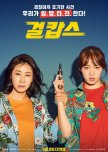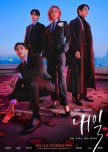
This review may contain spoilers
Gritty, Guttural, and Brutal
[ Not very obvious possible trigger warnings: Sexual harassment ]Set in 2014, it's a short kdrama, 6 episodes at the time of writing this(season 1), though not "sweet" in any sense of the word. It's grim and depressing, which isn't a bad thing. I certainly enjoyed it, and it made me feel for the characters, not just the protagonist and deuteragonist but for a lot more than just them.
The main takeaway I want this review to impart is this; If you romanticise the military, this kdrama probably isn't for you. It's a look at abuse within the (South Korean) military, and its heavy history of hazing - a practice not limited to SK's military - and the very nature of the self-perpetuating cycle of abuse exacerbated by the system/its perpetrators' indifference and even encouragement of the power abuse. There's themes of toxic masculinity(as armies are typically known for in pop-culture), psychological damage, sexual harassment and the strange obsession with one's "manhood"(genitalia), and general hopelessness. It's not the show pulling you aside and proclaiming, "THIS is the reality, and it can't be changed!". It's more of, "This is the reality. Do with that knowledge what you will."
The ending tore me apart, and I don't mean the ending where Jun-ho disobeys his superior and runs off into God knows where, but the one where you stay past the black screen. You'll catch a glimpse of "Fat Ass", a friend of the man you just watched shoot himself in front of Jun-ho. He's been bullied too, and it hits even harder taking into account one of the reasons he might've bonded with Suk-bong was because they both shared one thing: They were both treated like dogshit by everybody in their respective unit. After all, "I should do something."
The abuse, bullying, and harassment isn't immediate. It's clear from the progression of these episodes, and mirrors real life, that it is a bunch of acts in succession that pile atop one another until the victim's shoulders break from the crushing weight. The psychological, physical, and emotional trauma of it all mixed with hormones, heavy testosterone-drunk machoism of the military's environment, boils over into the amalgamation of consequences by end episode. Suk-bong's case is fictional and very extreme, yet it drives home the point. What does a frightened animal do when it's cornered? Only what it must. Protect itself.
For Suk-bong and his friend, that meant doing what they did. The kdrama doesn't justify that, but instead gives me this impression, "Must we wait until things are taken to the extreme before appropriate action is taken?"
Interestingly, before storming the tunnel, SDT's commander responds to Sergeant Park's protests with the reminder of the shootings in one of the Units, later mirrored in the true ending. One of Hang-soo's lackeys was also, himself, a victim of the abuse(as was everybody) by Hwang-soo, and he instead chose to take it out on Suk-bong. This is present in both the macro- and micro-level of these relationships between everybody involved. There's a reason for everybody's actions in this kdrama without vilifying, romanticising, and/or justifying, and the cycle of trauma and abuse is clear. The attention to detail and empathy is astounding, in a positive way.
As someone who's a victim of abuse, though not to this drama's extent, Jun-ho and the others' experiences resonate with me thematically. I don't subscribe to the theory that Jun-ho "snaps" in the "ending" where he runs off, but instead a small act of rebellion against the system, and a refusal of passivity and the so-loved conformity. It is the little successes that build up to big things eventually, and that leaves the viewer with just the tiniest sliver of hope, in my opinion.
Was this review helpful to you?

This review may contain spoilers
My motion graphics lecturers would cry tears of joy at that ending ngl
Honestly I'm glad I'm close to ending this year with one of the best films I've ever watched.It's a feelgood movie with the right amount of comedy that's executed pretty well. Just when I thought the humour would peak at the "Guy comes out of elevator door and bends over and drops everything he has" (if you've watched, you know what I mean) scene, there were [i]more[/i] funny scenes.
It's not just all comedy though, and when it's supposed to be serious it really does succeed at being poignant and serious about the subject matter. With the context of the sexism that still exists in Korean society(to my knowledge) and in general when it comes to workplaces in Asia, the movie's backstories and motivations for the two protagonists made sense thematically and didn't feel too preachy. Acting from the leads and supporting cast was superb, and I really enjoyed their chemistry!
I guess it just...made sense? Characters that seemed irritating at first grow and change throughout which was really nice to see. The plot isn't some meditative philosophical focus on the topic, it manages to get the point across and address its issue while remaining pretty respectful, which I enjoy.
It's also why I mentioned this is a good feelgood movie if you just want to see good triumphing over shitty people - because c'mon, we all need that shit in our lives every now and then. At least, I do. Sometimes I just want something that's funny and action-packed with the most "cliche" trope of good being pitted against all sorts of bad, because it's a reliable feelgood type of thing.
The motion graphics near the end was fascinating as well, and the VFX throughout the movie.
One of my only complaints is that the camera work can be very wonky and disorienting, especially near the end. But it's not THAT horrible, so it doesn't change my opinion of the movie much, if at all. Furthermore, though this may be on Netflix's end, the translation is confusing when it comes to the introducing of Ji Chul and how he relates to the two protagonists. I could never figure out if he's a brother-in-law, if Ji Hye is his wife, if Mi Young is HIS wife, and other such stuff. Though looking at the cast it seems clear who's related to who because of the names...? Kind of? It's quite confusing. But again, probably just a Netflix translation error and not the script's fault, who knows. It's a small gripe anyway.
Overall, I really enjoyed this! I wish there was more to the OST though, and as I mention that I realise I don't remember any music that struck me as anything during the movie(usually I notice instrumentals playing), though vague recollections of one instrumental that compliments one of the action scenes decently enough. More care could've been put into the OST, but it's not something that drags the movie down in my opinion. The theme song bangs too. :)
Was this review helpful to you?

Damn I Sure Do Wish I Knew Stuff About Baseball
I know nothing about baseball. I'm pretty sure a lot of people you'll ask who've watched this also don't know anything about baseball.Yet Hot Stove League is so riveting. The baseball premise and terminology might scare you at first, but I mean it when I say the story and characters are enjoyable even if you know literally nothing about baseball. The baseball terms and game itself are kind of unimportant, dare I say, and you aren't losing out if you don't read up on the sport. It's the characters, their relationships, and the story that drives this show!
Baek Seung-Soo is incredibly pragmatic(frankly, to a fault) and his work is his number one priority. Despite his cold and seemingly unwelcoming personality and wit, he's surprisingly charming. Throughout the show, I found myself rooting for him - not that I disliked him, I was curious as to how the show would handle his character - and every time he solved an issue it didn't feel like a cheap one-solution-fixes-all kind of gimmick. Every time Baek Seung-Soo solved an issue(alone or with others), it was believable and it was so...him. He's not perfect, sometimes you can see him genuinely struggle and just like real life, his attitude is not necessarily well-received.
I think that's one selling point too, the fact that the other characters are actually human, responding to Baek Seung-Soo's attitude much like how any viewer would, especially without much knowledge or context regarding his demeanour. They have their own lives, beliefs, and reasons for doing what they do. Mr. Baek may be the focus out of all the characters, but the writing doesn't neglect the development and growth of the staff, main baseball players, and even the higher-ups uninvolved in the nitty-gritty of baseball and the Dreams.
And what does that mean? Why does that matter? Because it shows HSL is more about office politics, uncaring higher-ups, personal development of characters, and how these characters work to solve problems. It's got baseball,
I particularly appreciate the lack of romance in this kdrama as well. Don't get me wrong, I like relationships and comedic couples in shows, but sometimes I just want a kdrama without the need for driving the plot with romance. Sometimes I just don't care about the "chemistry", I want the life stories and the problem-solving. HSL pleases me in that sense, because the characters are work-driven and platonic, focusing on respect and lack thereof. Lee Se-Young is focused on her work and on protecting the people in her workplace, very much like Seung-Soo, and I appreciate that there's no room for romance in their relationship as Operations Manager and General Manager respectively.
ALL the actors have done well, and I loved all their performances throughout this show. The characters you're supposed to dislike, you dislike, the characters you're supposed to root for, you root for. Even the "good guys" do bad things, they're not one-dimensional and neither are the "antagonists". They're all doing their in-show job, they have their reasons, just like the Dreams do.
This is a minor detail, but one I admire just as much as I adore the rest of the aspects of this show - the sound design. Is that the right term? I'm not quite sure. What I'm talking about is the background music that plays during certain moments of note, like tense moments and high-stress situations. When these situations happen, the music kicks in and it makes me feel the emotion the scene is supposed to evoke even MORE strongly. I can't stress enough how the tense moments made me feel even more tense because of the music, or the heartwarming moments that made me feel so happy and almost drive me to tears because of the song choice and/or background music.
Overall, an enjoyable kdrama. It's up there on my list of favourites, and if I recall correctly, episode 1 started off strong with a problem that needed solving. It was what made me want to sit through this drama, and I'm glad I did! Give HSL a try, I think its episodes are compelling enough to keep your attention long enough.
Was this review helpful to you?

"I don’t want tomorrow to come."
EVERYONE THAT FATE BRINGS TOGETHER MUST PART AT LEAST ONCE, WHETHER THEY LIKE IT OR NOT. — Koo RyeonFrankly I don't have anything to say regarding objective facts(statistics, data, quotes, etc.) about the kdrama. All I want to say is, this was a startlingly good kdrama.
My review is going to be heavily biased, as I really, really unashamedly love this kdrama with all my heart. So if you're expecting a relatively "objective" review with pros and cons, this isn't the review for you (actually, majority of my reviews aren't).
The series follows protagonists Jun-Woong, Ryon, and Ryung Goo as they traverse difficult and emotionally tense situations trying to save people from the brink of death under the crisis management team, "RM". RM is a temporary branch of Jumaedung, essentially this drama's version of South Korea's afterlife. I specifically point out South Korea because at some point in one of the episodes, it's possibly implied there's different afterlives depending on the country. I *think.*
Additionally, the trio deal with their own struggles with their pasts and presents. Jun-Woong is a likeable protagonist, written to mean well while at the same time still being as sensitive to issues as he can even if he doesn't have the experience or capability to fully understand and/or empathise. Ryon and Ryung Goo grow on you after 1 or 2 episodes with them. Especially when you find out why they're doing the job that they do...
I've struggled with depression, anxiety, and suicidal ideation often in the past, and still do now. Every now and then there are those thoughts that haunt me and there's always the fear that one day I'll give in and, well, you know. But Tomorrow has provided me a drastically different lens to view my situation in. Not just about suicide, but about living and choosing how I live, too.
All these stories were poignant and wonderful, every episode made me tear up even if that wasn't the intention. Each episode is meaningful and there's always a takeaway from them no matter how small or subtle. Episodes 6 and 7(the latter being my absolute favourite) were the ones that stood out the most for me, everything from story to soundtrack and premise of it. Episode 2 comes in close as well.
For the sake of transparency, I will admit that Ep7 and 2 deal with issues that I myself have dealt with personally in my life, and the consequences of such mirror mine in some way. These fictional depictions of traumas are traumas that I myself can relate to.
Ep7's Bo Ram and her confidence was empowering. Ye-Na's backstory was emotional and beautifully poignant. I particularly liked the sequence at the end Ye-Na has in her mind, it was fantastically done even with no words.
I hardly grow attached to many kdrama characters, but after spending so many episodes with these three(and sometimes other Jumaedung staff) have made so much of an impact on me after seeing how they work and make decisions. The ideas this kdrama puts forth and the wonderful quotes that spawn from it are beautiful and very much worth witnessing.
This kdrama came at a time where despite faring better mentally and emotionally than past years, I was still very vulnerable and uncertain. As I've mentioned, there are times where I have felt suicidal and in those moments I desperately wish to hear certain things. My experiences don't account for every single person with similar struggles out there, and I don't claim they do, but this kdrama helped me personally. It reminded me of concepts, ideas, things I can keep in mind in the future and even now. The dialogue and thinking these characters have, like Joong Gil(the stoic reaper you'll see pretty soon), are realistic enough to be believable. I've heard, seen, and with some phrases even echoed, these sorts of thoughts and words. I've given, and I've been on the receiving end. Dealing with the suicidal often requires tact and caution, and despite how abrasive Ryon can be initially, it's surprisingly believable how the people they're helping react.
To conclude, I wasn't kidding when I said I really liked this kdrama. One of my top favourites in recent memory *for sure*, and it's probably staying that way for a long, long time. I'm glad I didn't drop this when I wanted to, and finished it when I did. Worth a watch, and worth a rewatch too. If you're into social issues in S.Korea being depicted and grappled with in a kdrama, and can stomach suicide, you might enjoy this like I did.
Was this review helpful to you?







